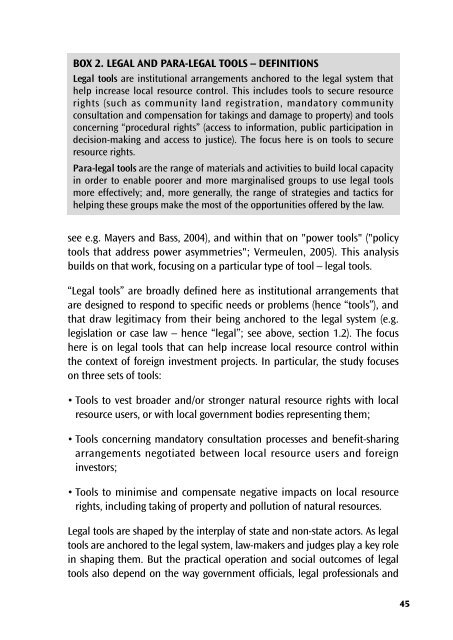Legal empowerment for local resource control
Legal empowerment for local resource control
Legal empowerment for local resource control
You also want an ePaper? Increase the reach of your titles
YUMPU automatically turns print PDFs into web optimized ePapers that Google loves.
BOX 2. LEGAL AND PARA-LEGAL TOOLS – DEFINITIONS<br />
<strong>Legal</strong> tools are institutional arrangements anchored to the legal system that<br />
help increase <strong>local</strong> <strong>resource</strong> <strong>control</strong>. This includes tools to secure <strong>resource</strong><br />
rights (such as community land registration, mandatory community<br />
consultation and compensation <strong>for</strong> takings and damage to property) and tools<br />
concerning “procedural rights” (access to in<strong>for</strong>mation, public participation in<br />
decision-making and access to justice). The focus here is on tools to secure<br />
<strong>resource</strong> rights.<br />
Para-legal tools are the range of materials and activities to build <strong>local</strong> capacity<br />
in order to enable poorer and more marginalised groups to use legal tools<br />
more effectively; and, more generally, the range of strategies and tactics <strong>for</strong><br />
helping these groups make the most of the opportunities offered by the law.<br />
see e.g. Mayers and Bass, 2004), and within that on "power tools" ("policy<br />
tools that address power asymmetries"; Vermeulen, 2005). This analysis<br />
builds on that work, focusing on a particular type of tool – legal tools.<br />
“<strong>Legal</strong> tools” are broadly defined here as institutional arrangements that<br />
are designed to respond to specific needs or problems (hence “tools”), and<br />
that draw legitimacy from their being anchored to the legal system (e.g.<br />
legislation or case law – hence “legal”; see above, section 1.2). The focus<br />
here is on legal tools that can help increase <strong>local</strong> <strong>resource</strong> <strong>control</strong> within<br />
the context of <strong>for</strong>eign investment projects. In particular, the study focuses<br />
on three sets of tools:<br />
Tools to vest broader and/or stronger natural <strong>resource</strong> rights with <strong>local</strong><br />
<strong>resource</strong> users, or with <strong>local</strong> government bodies representing them;<br />
Tools concerning mandatory consultation processes and benefit-sharing<br />
arrangements negotiated between <strong>local</strong> <strong>resource</strong> users and <strong>for</strong>eign<br />
investors;<br />
Tools to minimise and compensate negative impacts on <strong>local</strong> <strong>resource</strong><br />
rights, including taking of property and pollution of natural <strong>resource</strong>s.<br />
<strong>Legal</strong> tools are shaped by the interplay of state and non-state actors. As legal<br />
tools are anchored to the legal system, law-makers and judges play a key role<br />
in shaping them. But the practical operation and social outcomes of legal<br />
tools also depend on the way government officials, legal professionals and<br />
45

















